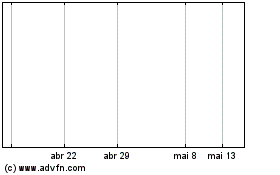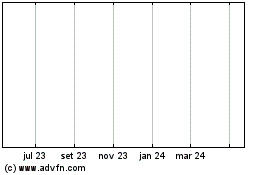Greek Court Rejects Government's Plan to Revamp Media Sector
27 Outubro 2016 - 4:30AM
Dow Jones News
ATHENS—Greece's ruling Syriza party suffered a major
embarrassment on Wednesday night when judges struck down its plan
to revamp Greece's media sector, after a weekslong power struggle
that produced allegations of blackmail and "fascist" methods.
Greece's supreme administrative court, the Council of State,
ruled the government, led by the left-wing Syriza party, acted
unconstitutionally by licensing TV broadcasters itself, a power
that the constitution reserves for an independent media
regulator.
In early September, the government auctioned broadcast permits
for only four private TV channels, leaving several existing TV
stations facing closure. The court ruling annuls the government's
auction and removes the threat of forced closures.
The government, led by the antiestablishment left-wing movement
Syriza, billed its reform of Greek TV as necessary to combat
corruption and dismantle a network of vested interests among media
moguls, banks and the political establishment.
Greece's media and conservative-led opposition accused Syriza of
a power grab and an attack on free speech.
Government spokeswoman Olga Gerovasili criticized the court
ruling for annulling €255 million (about $278 million) of auction
revenue, which she said would have paid for 14,000 more children to
go to kindergarten and 4,000 more nurses to work in hospitals.
In recent days, the looming court defeat has forced Prime
Minister Alexis Tsipras to publicly defend his controversial aide,
Minister of State Nikos Pappas, who handled the TV license auction
and is viewed as the premier's most powerful adviser.
The court case has dealt a blow to Syriza's image as a new broom
sweeping clean Greece's murky politics. The Syriza-appointed
president of the Council of State, Nikos Sakellariou, had resisted
media owners' appeals against the license auction. But he faced
opposition from other judges, including Athanasios Rantos.
On Oct. 13, leaked emails about Mr. Rantos's private life
appeared on a Greek news website, after which Greece's justice
ministry ordered a disciplinary investigation against the
judge.
Other judges were incensed. The Union of Judges and Prosecutors
issued a statement condemning "an attempt to blackmail the supreme
court" with tactics "reminiscent of methods used by fascist
regimes." The statement didn't identify a culprit. Amid acrimony
and divisions at the court, a narrow majority of judges voted to
annul the government's auction late Wednesday.
The TV shake-up was the centerpiece of Syriza's effort to
challenge the vested political and business interests that Messrs.
Tsipras and Pappas say have long controlled Greek public life.
Syriza, an upstart movement with roots in anticapitalist
protest, shot to power in 2015 amid Greece's deep economic crisis,
promising radical change at home and in Europe. It has struggled on
both fronts.
Last year, Mr. Tsipras fought and failed to overturn the tough
austerity conditions of Greece's international bailout. German-led
creditors forced him to sign a tough new bailout deal or face Greek
expulsion from the euro.
This year, seeking to maintain his radical credentials, Mr.
Tsipras took on some of Greece's business oligarchs, whose
conglomerates control much of the country's media as well as other
sectors from shipping to public works. But Mr. Pappas's TV-permit
auction soon ran into trouble.
Critics said Syriza's media reform looked more like a bid to
create its own network of power relationships with new, friendly
media owners. Syriza's relations with a winning TV-license bidder,
Yiannis Kalogritsas, and a small bank that financed him, drew
particular scrutiny.
Greece's independent central bank, angering Syriza officials,
submitted a report to parliament and prosecutors that questioned
the small lender's loan practices and the quality of Mr.
Kalogritsas's collateral. Mr. Kalogritsas withdrew his bid and said
he was a victim of Greece's establishment, which was treating him
like a criminal.
While the Bank of Greece was probing the lender, prosecutors
raided a business owned by the central-bank governor's wife, adding
to fears of growing political intervention in Greece's
judiciary.
The perception of pressure on the Council of State deepened
those fears and contributed to the government's defeat on
Wednesday, say people close to the judiciary.
Write to Marcus Walker at marcus.walker@wsj.com and Nektaria
Stamouli at nektaria.stamouli@wsj.com
(END) Dow Jones Newswires
October 27, 2016 02:15 ET (06:15 GMT)
Copyright (c) 2016 Dow Jones & Company, Inc.
Bank of Greece (CR) (ASE:TELLE)
Gráfico Histórico do Ativo
De Mar 2024 até Abr 2024

Bank of Greece (CR) (ASE:TELLE)
Gráfico Histórico do Ativo
De Abr 2023 até Abr 2024
